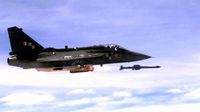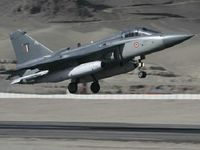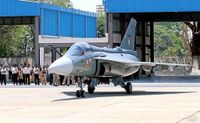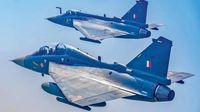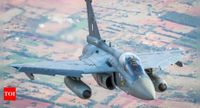NEW DELHI: The Indian defense sector has received a significant boost with the recent delivery of the first F-404 engine for the Tejas Mark-1A fighter jets by US defense giant General Electric (GE) Aerospace. This delivery marks the end of a two-year delay and is expected to accelerate the production of the indigenous jets by Hindustan Aeronautics Limited (HAL), which has faced multiple setbacks in meeting the Indian Air Force's (IAF) requirements.
GE Aerospace announced on March 26, 2025, that it had successfully delivered the first of 99 contracted F-404 turbofan engines to HAL, a crucial step for the Tejas Mk-1A program. The engines were part of a deal worth approximately Rs 5,375 crore, signed in August 2021, which aimed to enhance the IAF's fleet with advanced indigenous aircraft.
According to HAL, the production of the Tejas jets is set to ramp up significantly, with plans to increase output to 20 jets annually, and eventually up to 24 jets per year. This increase is facilitated by the establishment of a new production line in Nashik, complementing the existing facilities in Bengaluru. In total, HAL has contracted for 83 Tejas Mk-1A jets, valued at Rs 46,898 crore, with the first deliveries initially scheduled for March 2024.
However, the IAF has expressed concern about the slow pace of production, with Air Chief Marshal A P Singh publicly stating that the force is “very badly off in numbers” and requires at least 40 new fighters each year to remain combat-ready. To date, the IAF has received only 38 of the first 40 Tejas Mk-1 fighters ordered under contracts from 2006 and 2010.
Shawn Warren, general manager of combat and trainer engines at GE Aerospace, emphasized the significance of this delivery, stating, “On Tuesday, we were excited to deliver the first of 99 F404-IN20 engines to our valued customer HAL. It is an important milestone in our 40-year relationship with HAL and in our efforts to ensure a strong future for India’s military by developing next-generation fighters while enhancing the country’s defense manufacturing capabilities.”
The F404-IN20 engine is a tailored design specifically for the Tejas Mk-1A, offering the highest thrust within the F404 family, which powers thousands of combat aircraft globally. GE Aerospace had previously delivered 65 F404 engines for the earlier Tejas Mk-1 variant, but the production line was shut down due to a lack of additional orders until HAL's recent contract.
The delay in engine supply has been attributed to several factors, including the challenges of restarting the production line after it had been dormant for five years. Warren noted that the complexities were exacerbated by the COVID-19 pandemic, which posed additional hurdles in the supply chain. However, GE Aerospace has successfully ramped up production capabilities and is expected to deliver 12 engines this year, with plans for 20 engines annually thereafter.
As the Tejas Mk-1A program progresses, HAL is also negotiating the co-production of the more powerful GE-F414 engines in India, which will further enhance the capabilities of the indigenous fighter jets. This deal includes an 80% transfer of technology for around $1.5 billion, marking a significant step towards self-reliance in defense manufacturing.
Investor sentiment around HAL has improved following the engine delivery, with shares rising more than 26% in the last month. ICICI Securities recently upgraded HAL’s rating from ‘add’ to ‘buy’, revising its target price from Rs 4,065 to Rs 5,000 per share, citing reduced execution risks and a stronger earnings outlook. Global brokerage firm JPMorgan also expressed optimism, setting a target price of Rs 4,958 for HAL shares, maintaining an ‘overweight’ rating.
HAL's ambitious production plans are seen as vital for the IAF, which currently operates only 30 fighter squadrons, well below the authorized strength of 42.5 squadrons necessary to address the challenges posed by neighboring countries, particularly China and Pakistan. The upcoming contracts for an additional 97 Tejas Mk-1A fighters, valued at approximately Rs 67,000 crore, and 108 Tejas Mk-2 variants are also critical for the IAF's future capabilities.
In the backdrop of these developments, HAL's leadership has been under scrutiny. Air Chief Marshal Singh's remarks about HAL's ability to meet the IAF’s needs indicated a lack of confidence in the state-run manufacturer. However, HAL's chief, D.K. Sunil, has focused on expediting the delivery of the new aircraft rather than engaging in disputes over criticism.
As the Tejas Mk-1A program continues to evolve, its success is crucial not only for the IAF's operational readiness but also for India's aspirations in defense manufacturing. The delivery of the F404 engines is a pivotal moment that could set the stage for a new era in India's military aviation.
With the first engine now delivered and production capabilities expanding, HAL is well-positioned to enhance its role in India's defense sector, reinforcing investor confidence in its long-term prospects and the future of the indigenous fighter jet program.
